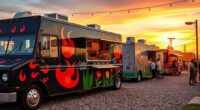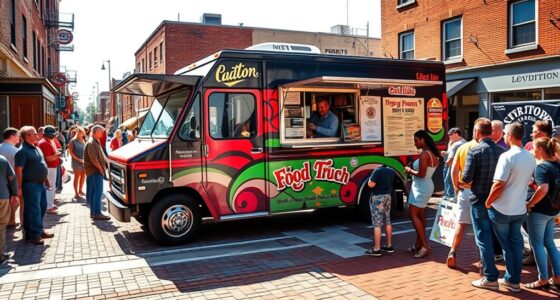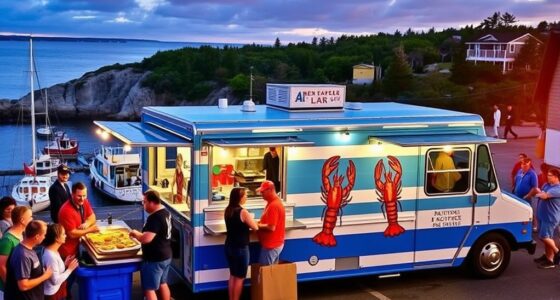Choosing between buying or leasing food truck equipment depends on your budget, flexibility needs, and long-term plans. Buying involves higher upfront costs but offers ownership benefits like control over maintenance and building equity. Leasing reduces initial payments and allows for easier upgrades, but may limit control and involve ongoing fees. We’ll explore how each option impacts your cash flow, taxes, and growth potential to help you make the best choice for your business.
Key Takeaways
- Buying involves higher upfront costs but offers long-term asset value and depreciation benefits.
- Leasing reduces initial payments and includes maintenance, providing flexibility for updates and upgrades.
- Ownership allows full control over maintenance, branding, and modifications, supporting business growth.
- Leasing simplifies expenses with included services, while buying requires managing repairs and parts separately.
- Consider financial situation, long-term plans, and equipment flexibility to choose the best option.
Cost Considerations and Budget Impact

When deciding whether to buy or lease food truck equipment, understanding the cost implications is essential. Buying involves higher upfront expenses, including insurance costs, which can add to your overall budget. You’ll also need to weigh resale value; purchasing equipment means you can recoup some costs when you sell or upgrade later. Leasing usually requires lower initial payments and might include maintenance, but monthly lease payments can add up over time. Insurance costs for leased equipment might be higher or lower depending on the lease agreement. Additionally, buying offers long-term savings if the equipment lasts several years, while leasing can be more flexible but may not build equity. It’s also important to consider the potential security vulnerabilities associated with each option, especially as they relate to payment processing systems. Properly understanding cost analysis and the potential for hidden fees can help prevent unexpected expenses. Being aware of lease terms and conditions can prevent surprises and ensure that your investment aligns with your operational needs. For instance, some lease agreements might have early termination fees that could impact your flexibility. Carefully evaluate these factors to see which option aligns best with your budget and operational goals. Affiliate commissions earned from qualifying purchases can sometimes influence the overall cost considerations when selecting equipment options.
Ownership Benefits and Long-Term Value
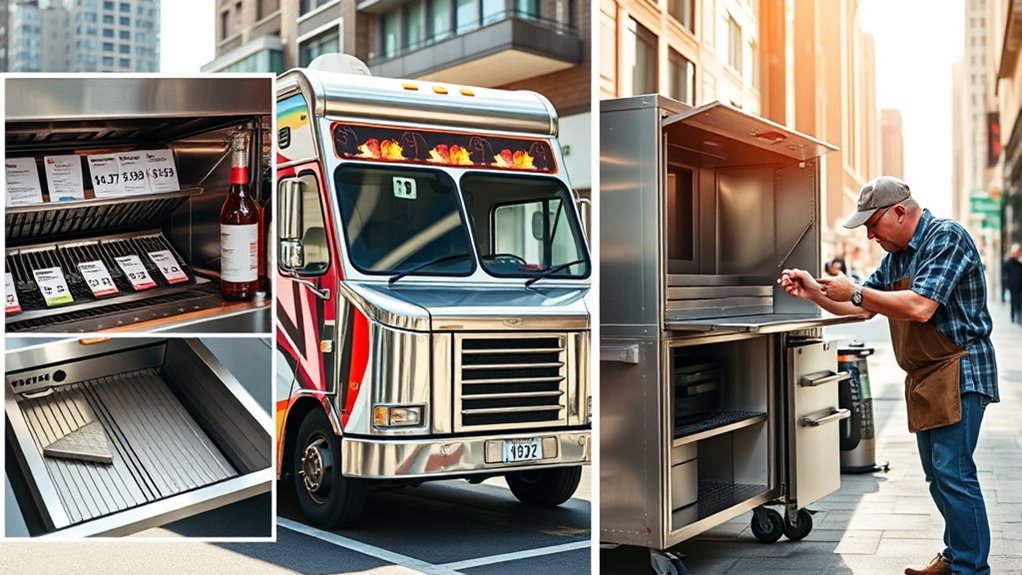
Owning food truck equipment offers significant long-term advantages that can enhance your business’s stability and growth. When you own your equipment, you control how it’s maintained and branded, which directly impacts your brand reputation. A well-maintained truck with customized branding sets you apart in a competitive market, especially where market saturation is high. Ownership allows you to build equity over time, making your investment more valuable as your business expands. Unlike leasing, ownership eliminates ongoing rental or leasing payments, leading to better financial predictability. Additionally, owning your equipment provides the flexibility to make modifications that suit your evolving menu and branding strategies. Embracing creative practice in your approach to business can also foster innovative solutions and adaptability. Developing a growth mindset can help you see ownership as an opportunity for continuous improvement and innovation. Recognizing the importance of spiritual energy can inspire a positive outlook and resilience during business challenges. Incorporating long-term planning into your strategy ensures sustainable success and helps you navigate market fluctuations. Engaging with visionary insights can motivate you to set bold goals and pursue them with confidence. Overall, ownership positions you for sustained success, giving you a long-term asset that supports your growth ambitions.
Flexibility and Equipment Upgrades
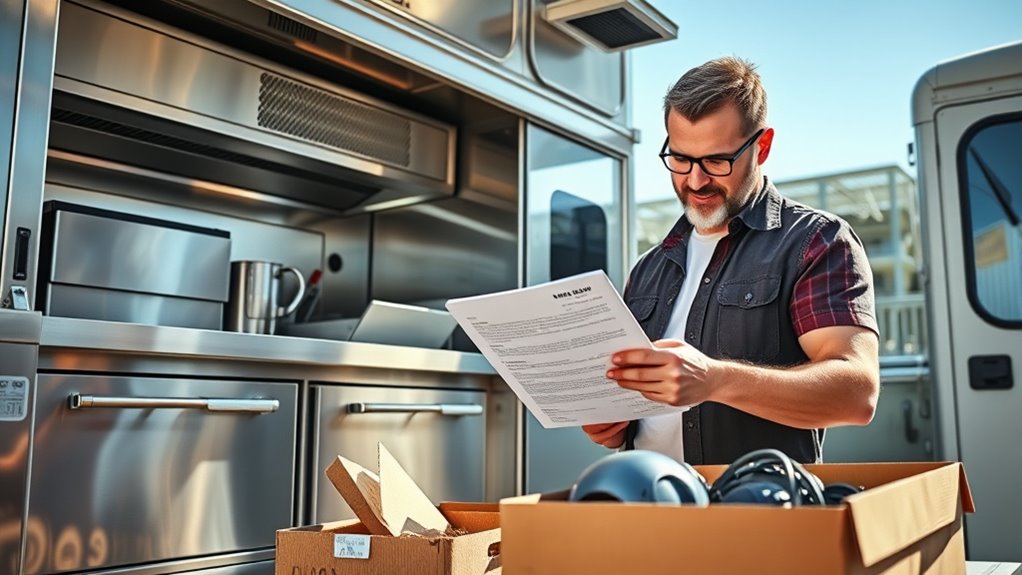
When it comes to flexibility and upgrades, leasing often offers more options for customization and faster upgrades. You can adapt your equipment more easily to changing needs without the long-term commitment of ownership. This approach helps you stay current with technology and trends, ensuring your truck remains competitive. Additionally, access to resources and tools can simplify the process of maintaining and upgrading your equipment over time. Leasing agreements may also include maintenance and support services, further reducing your operational burdens. Moreover, choosing to lease can provide you with cost-effective solutions that align with your evolving business needs and budgets. Leveraging modern equipment options through leasing can also give your food truck a more professional appearance, attracting more customers and increasing revenue. Incorporating up-to-date technology can enhance efficiency and customer experience, giving you a competitive edge in the food truck industry.
Customization Options Flexibility
Leasing food truck equipment often offers more flexibility for customization and upgrades compared to buying. This means you can easily adapt your setup to match your menu customization needs or update branding flexibility without major costs. Leasing companies typically allow you to modify the equipment to better suit your brand or menu, giving you creative freedom. Additionally, currency fluctuations can impact the cost-effectiveness of leasing versus purchasing, so it’s important to consider exchange rates if dealing with international leasing options. By choosing leasing, you can also benefit from extended hours for equipment use that might not be available with ownership, allowing for more operational flexibility. Here are some benefits:
- Quick adjustments to layout for new menu items
- Easy branding modifications for seasonal promotions
- Access to modular equipment for tailored configurations
- Flexibility to experiment with different setups without long-term commitment
This adaptability ensures your food truck stays current and aligned with your evolving business goals, helping you stand out and attract loyal customers.
Upgrade Frequency Ease
Upgrading food truck equipment can be more straightforward with leasing, as it allows you to refresh your setup more frequently without significant hassle. If you want to keep your food truck branding fresh and appealing, leasing makes it easy to swap out equipment or update features regularly. This flexibility means you can choose equipment with new color options, helping your truck stand out and attract customers. Leasing agreements often include upgrade options, so you can stay current with the latest technology or design trends without large upfront costs. This ease of upgrades ensures your food truck remains competitive and visually appealing. Overall, leasing provides the agility to adapt your equipment quickly, keeping your branding vibrant and your operations efficient. Incorporating easy-to-maintain materials can also prolong the lifespan of your equipment and reduce ongoing maintenance efforts, especially when considering family influences that shape your approach to business and equipment management. Additionally, understanding support hours and service availability can help you address maintenance or upgrade needs promptly, minimizing downtime. Regularly reviewing durability features can further ensure your equipment withstands the demands of daily operation and harsh conditions, and staying informed about conflict resolution skills can help troubleshoot any issues that arise.
Long-term Adaptability
Long-term adaptability is a key advantage of leasing food truck equipment because it provides you with ongoing flexibility to update and modify your setup as your business evolves. When leasing, you can easily adjust your menu customization options or upgrade equipment to meet new culinary trends. This flexibility also enhances branding opportunities, allowing you to refresh your truck’s look without major costs. Consider these benefits:
- Quickly incorporate new kitchen appliances or tools
- Adjust equipment layout for changing menu items
- Upgrade branding elements like signage and graphics
- Stay current with industry standards and customer preferences
- Maintaining compliance with legal and safety regulations is easier when leasing, as less responsibility for extensive upgrades falls on the lessee. Additionally, leasing equipment often includes regular maintenance, reducing downtime and ensuring your operations remain smooth.
Leasing makes it simple to stay adaptable and competitive, ensuring your food truck remains relevant and appealing over time.
Maintenance Responsibilities and Costs
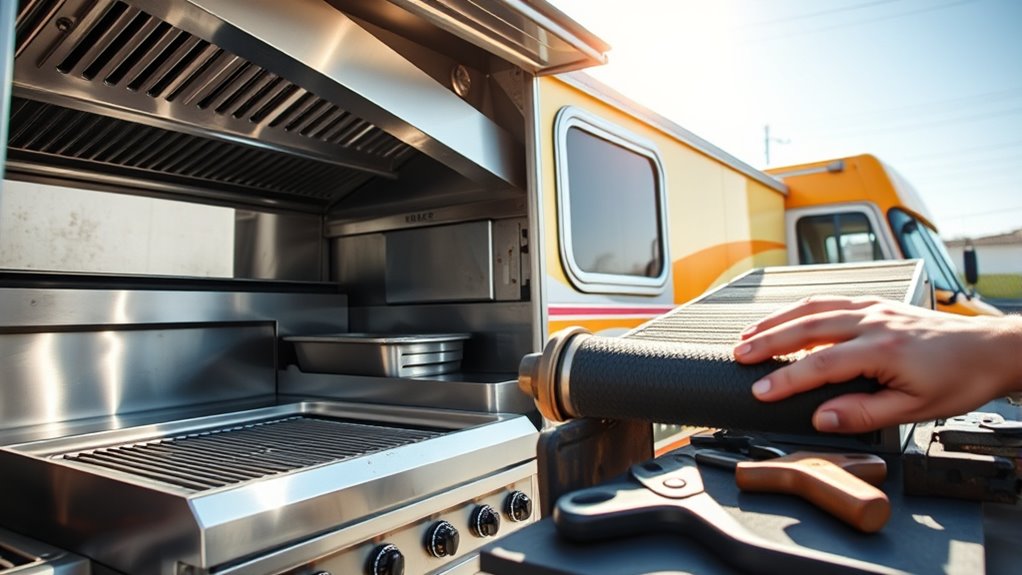
When it comes to maintaining food truck equipment, your responsibilities and costs can vary considerably depending on whether you buy or lease. If you buy equipment, you’re responsible for regular maintenance, repairs, and managing your supply chain for replacement parts. Building strong vendor relationships becomes vital to guarantee timely repairs and genuine parts. Conversely, leasing often includes maintenance services as part of the agreement, reducing your direct costs and responsibilities. However, you may have less control over the quality of parts or service providers. In both cases, understanding your supply chain and establishing reliable vendor relationships can help minimize unexpected expenses and keep your equipment running smoothly. Ultimately, your choice impacts ongoing maintenance commitments and how you manage costs over time.
Impact on Cash Flow and Financing Options
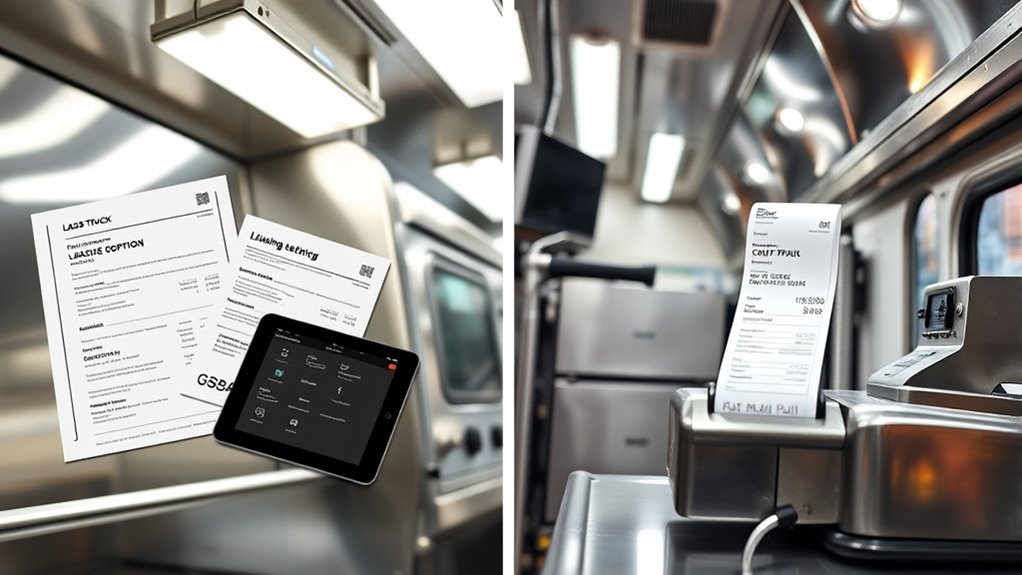
Your cash flow can be considerably affected by whether you buy or lease your food truck equipment. Buying usually requires a larger upfront investment, while leasing spreads out payments over time. Exploring loan and lease options helps you find a financing plan that best fits your budget and business goals.
Upfront Cost Differences
Buying food truck equipment typically requires a significant upfront investment, which can impact your cash flow and financial flexibility. This initial cost directly influences your ability to invest in menu customization and branding opportunities. Consider these key differences:
- Higher initial payment, limiting funds for other startup expenses.
- Greater control over equipment choices tailored to your menu and branding.
- Potential for better long-term value if equipment appreciates or lasts longer.
- Reduced ongoing payments, freeing cash flow for marketing or menu innovation.
While the upfront cost might seem formidable, owning equipment gives you flexibility in customizing your menu and strengthening your brand identity. This investment can pay off by establishing a unique presence that attracts loyal customers.
Loan and Lease Options
Opting for loans or leases can substantially impact your cash flow and financing options for a food truck. With loans, you’ll make regular payments, which can ease initial costs but may strain your budget over time. Leasing often requires lower upfront costs and can include insurance costs, simplifying expenses. Leasing agreements sometimes include equipment warranties, reducing repair costs and providing peace of mind. However, leases may limit customization and add to long-term costs. Loans can help build equity, but missed payments hurt your credit. Both options affect your cash flow differently—loans require steady payments, while leases might offer more flexibility. Carefully consider your financial situation, insurance costs, and equipment warranties when choosing between these options to guarantee sustainable growth.
Depreciation and Tax Implications
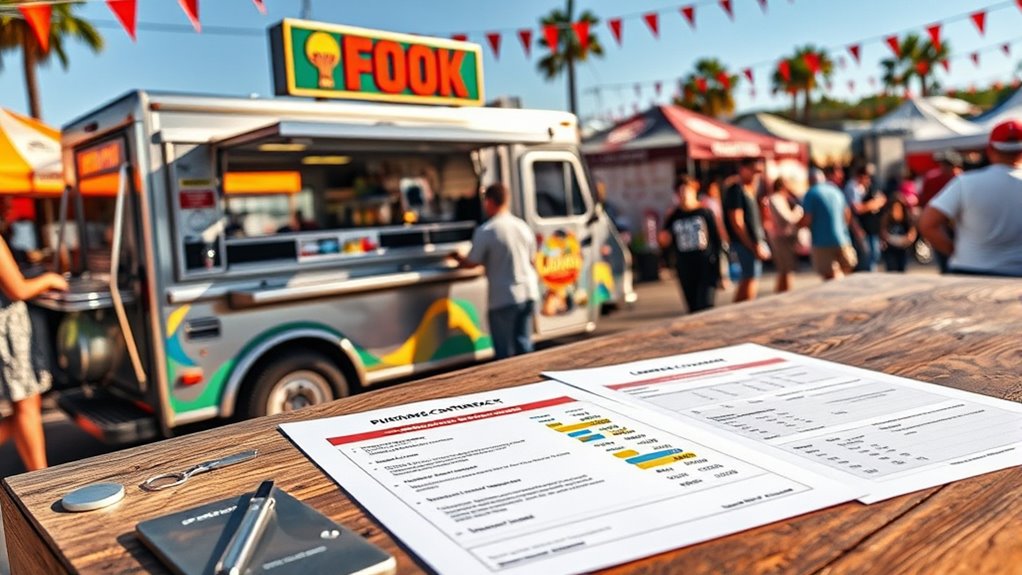
Understanding depreciation and tax implications is crucial when deciding whether to buy or lease food truck equipment. When you purchase, you can take advantage of depreciation benefits, reducing your taxable income over several years. This means you spread out the cost and gain potential tax savings. Conversely, lease advantages include simpler accounting and immediate expense deductions, often making taxes straightforward. Consider these points:
- Buying offers depreciation benefits, lowering taxes annually.
- Leasing can simplify tax filings with fixed monthly deductions.
- Depreciation schedules vary depending on equipment type.
- Lease advantages may include fewer upfront costs and flexibility.
Knowing how depreciation impacts your taxes helps you make smarter financial decisions, whether you buy or lease.
Strategic Planning for Business Growth
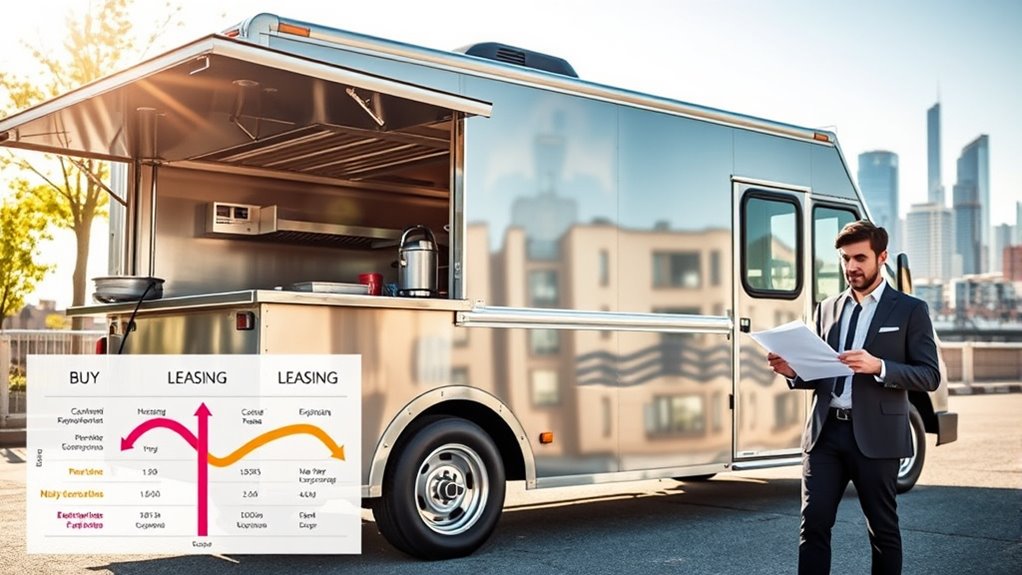
Effective strategic planning lays the foundation for sustainable business growth, especially as you evaluate how to finance and manage equipment investments like food trucks. Consider how your choices impact branding opportunities and marketing strategies. A well-thought-out plan helps you align your equipment decisions with your long-term goals, ensuring you can leverage your mobile presence to attract customers and build brand recognition. By focusing on growth strategies, you can identify the best financing options—whether buying or leasing—that support your expansion plans. Incorporate innovative marketing tactics that maximize your equipment’s potential, such as eye-catching branding on your truck or targeted social media campaigns. Strategic planning guarantees your equipment investments directly contribute to increased visibility, customer loyalty, and overall business success.
Frequently Asked Questions
What Are the Hidden Costs Associated With Leasing Food Truck Equipment?
Leasing food truck equipment might seem straightforward, but hidden costs can surprise you. You could face maintenance expenses if the equipment breaks down or isn’t covered by the lease. Additionally, upgrade costs may come into play if you want newer technology or better features before your lease ends. These hidden expenses can add up, so make sure you read your lease agreement carefully and budget for potential maintenance and upgrade costs.
How Does Leasing Affect Eligibility for Business Loans or Grants?
Did you know that 65% of small businesses report better loan qualification when leasing assets? Leasing can positively impact your credit, showing lenders you’re managing costs effectively. It may streamline your credit impact, making it easier to qualify for business loans or grants. However, missed payments or lease defaults could harm your credit score. So, leasing might help or hinder your loan prospects based on your payment discipline.
Can Leasing Arrangements Include Custom Modifications or Branding Options?
Leasing arrangements often include custom branding and modifications options, allowing you to personalize your food truck. Many leasing companies offer flexible customization packages to meet your branding needs, such as adding logos, graphics, or specific equipment. You can typically choose from various modification options to guarantee your truck aligns with your business image. Just confirm these details with your lease provider to make sure your branding and customization goals are achievable within your lease agreement.
What Are the End-Of-Lease Options if I Want to Keep the Equipment?
Imagine the thrill of keeping your food truck equipment long after the lease ends. You might have options like a lease extension, giving you extra time, or an equipment buyout, allowing you to own it outright. Think about the benefits of each—staying flexible or investing in your business. Don’t miss out on these opportunities; explore your end-of-lease choices carefully to determine what best supports your culinary dreams.
How Does Leasing Impact Insurance Requirements for My Food Truck?
Leasing your food truck impacts your insurance requirements by often increasing insurance premiums because the lease agreement may specify higher coverage levels. You need to meet lease requirements, which could include extensive and collision coverage, to protect the equipment and satisfy the lease terms. Make certain to review your lease contract carefully, as it often dictates specific insurance standards. Proper coverage ensures you stay compliant and avoid potential penalties or lease violations.
Conclusion
Choosing between buying and leasing your food truck equipment depends on your long-term goals and financial situation. Did you know that 65% of small business owners find leasing improves cash flow and allows for easier upgrades? By understanding your needs and considering factors like maintenance costs and tax benefits, you can make a smarter decision. Ultimately, aligning your equipment strategy with your growth plans helps guarantee your food truck venture’s success and sustainability.

